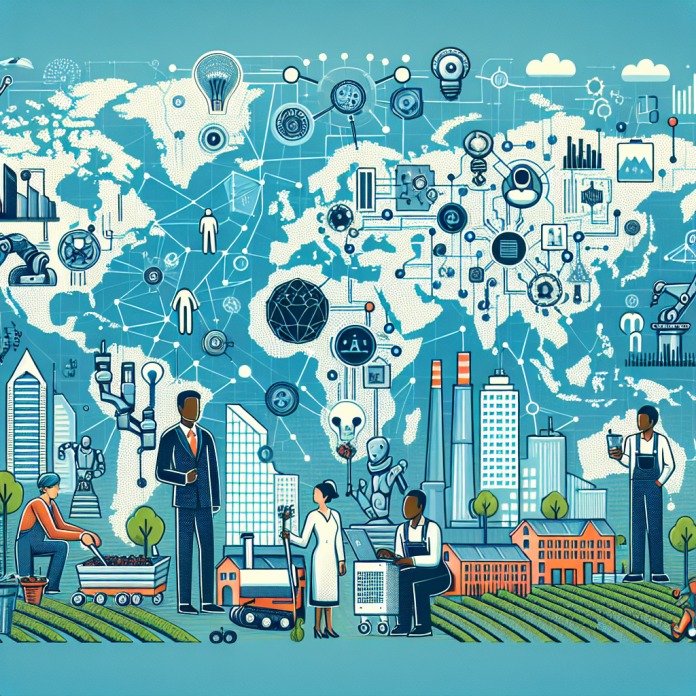AI’s Influence on Job Markets
Artificial Intelligence (AI) has revolutionized various industries, from healthcare to finance and transportation. Its impact on the job market, however, is a topic of increasing concern and debate. As AI technologies continue to advance at a rapid pace, many fear that automation will lead to widespread job loss and displacement. In this article, we will delve into the influence of AI on job markets, explore the potential implications for workers, and discuss strategies for adapting to this new era of automation.
**The Rise of AI in the Workplace**
AI has become increasingly integrated into various facets of the workplace, from automating routine tasks to enhancing decision-making processes. In recent years, businesses have been deploying AI-powered systems for data analysis, customer service, and even recruitment. For instance, companies like Amazon and Netflix use AI algorithms to recommend products or movies based on users’ preferences and behavior patterns.
As AI technology becomes more advanced, its applications in the workplace are likely to expand further. This trend has raised concerns about the future of work, especially for workers in industries that are susceptible to automation, such as manufacturing and transportation. The fear of job displacement is palpable, with reports suggesting that millions of jobs could be at risk in the coming years.
**Job Displacement vs. Job Transformation**
While it is true that AI has the potential to automate certain tasks and jobs, it is essential to recognize that not all jobs are at risk of being replaced by machines. Historically, technological advancements have led to job displacement, but they have also created new opportunities and transformed existing roles. For example, the rise of computers in the 20th century led to the decline of typists but gave birth to new jobs in software development and IT support.
Similarly, AI is likely to lead to the transformation of certain jobs rather than their outright elimination. Tasks that are repetitive and rule-based, such as data entry and processing, are more susceptible to automation. However, jobs that require creativity, empathy, and critical thinking are less likely to be automated. As AI takes over routine tasks, workers will have the opportunity to focus on higher-value activities that require uniquely human skills.
**Adapting to an AI-Powered Future**
In light of these changes, it is crucial for workers to adapt to the new reality of an AI-powered future. This requires a proactive approach to learning new skills and embracing technological advancements. For example, workers in industries that are at risk of automation can retrain or upskill to acquire expertise in fields that are less likely to be automated, such as data analysis or machine learning.
Moreover, businesses and policymakers play a crucial role in mitigating the potential negative impact of AI on job markets. Companies can invest in training programs for their employees to help them develop the skills needed to work alongside AI systems effectively. At the same time, policymakers can implement education and workforce development policies that encourage lifelong learning and skill-building.
**Real-Life Examples of AI in Job Markets**
To illustrate the influence of AI on job markets, let us consider some real-life examples of how AI technologies are being utilized in various industries:
1. Healthcare: AI-powered systems are being used to analyze medical images and diagnostic data, leading to more accurate diagnoses and treatment recommendations. While AI can automate certain tasks traditionally performed by radiologists, it can also enhance their capabilities and improve patient outcomes.
2. Retail: AI algorithms are helping retailers optimize their supply chain, forecast demand, and personalize customer experiences. While AI can automate inventory management and pricing decisions, it can also create new opportunities for retail workers to engage with customers and drive sales.
3. Finance: AI-powered chatbots are assisting customers with banking inquiries and providing personalized financial advice. While AI can automate routine customer service tasks, it can also free up human employees to focus on complex financial analysis and risk management.
**Conclusion**
In conclusion, AI’s influence on job markets is undeniable, but its impact is nuanced and multifaceted. While automation has the potential to displace certain jobs, it also creates new opportunities for workers to harness the power of AI and enhance their skills. By embracing technological advancements, investing in workforce development, and adapting to the changing nature of work, workers and businesses can navigate the challenges of an AI-powered future.
As we continue to witness the evolution of AI technologies, it is essential to approach the future of work with optimism and a willingness to adapt. By staying informed, proactive, and agile, workers can position themselves for success in a job market that is increasingly influenced by AI. The key to thriving in this new era of automation lies in embracing change and seizing the opportunities that AI brings to the table.

